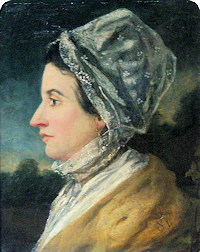
TL;DR:
Susanna Wesley (mother of John Wesley) offered timeless guidance for discerning right and wrong: avoid anything that weakens reason, dulls conscience, obscures awareness of God, or strengthens bodily desires over the spirit — even if it seems harmless. Classic single phrase definitions of sin have included: A corruption of good (Augustine), an offense against divine order (Aquinas), a willful turning from God (Edwards, Wesley), a relational rupture (Barth, Wynkoop), and
human autonomy and rebellion (Schaeffer).
Questions often arise about specific lifestyle choices ("standards," as they were called at one time).
College students struggle with deciding what behaviors would weaken their commitment to living a holy life rather than making decisions that would increase their commitment to beoing holy. I have fielded questions such as "Where in the Bible does it say it's a sin to drink beer?"
I like John Wesley's mother's advice on how Christians can decide what habits and lifestyle patterns they should avoid or eliminate. Since the Methodist Church was born out of the ministry of Susanna Wesley's son John, she is often called "the mother of the Methodist movement." When her son John was 22 years old, she wrote him a letter in which she said:
"Take this rule: whatever weakens your reason, impairs the tenderness of your conscience, obscures your sense of God, or takes off your relish of spiritual things; in short, whatever increases the strength and authority of your body over your mind, that thing is sin to you, however innocent it may be in itself."
— Susanna Wesley (Letter, June 8, 1725)

Although John Wesley did believe that all transgressions of divine will need God's forgiving grace, his working definition of sin was "a willful transgression of a known law of God" [ more on Wesley ]
Check out the self-examination questions used in discipleship groups spawned by John Wesley's Methodist movement.
The official Nazarene doctrinal statement defining sin includes these words:
"We believe that actual or personal sin is a voluntary violation of a known law of God by a morally responsible person. . . . We believe that personal sin is primarily and essentially a violation of the law of love and that in relation to Christ, sin may be defined as unbelief."
— excerpt from the Articles of Faith of the Church of the Nazarene
John Wesley composed a set of questions to help believers self-evaluate their heart condition. Here they are:
A spiritually healthy Christian life cannot be built on negatives. However, doesn't saying "yes" to some things (such as holy living) mean we will be saying "no" to some other things? The question is: Are we saying "yes" to the right things and "no" to those things that would damage or obliterate our "yes" choices?
The following material has been adapted from the contents of a publication by Focus on the Family.
Some years ago, Francis Schaeffer wrote a book titled How Should We Then Live? The question the book title asks is a good one. If we believe what we say we believe, then how should we live, particularly as it involves our entertainment choices?
Reflection questions on this point might include:
How would I feel if Jesus were to physically show up at my dorm room or home? Would I feel pride or embarrassment at having Jesus see the movies I watch or see my video game collection?
"I have given them your word and the world has hated them, for they are not of the world any more than I am of the world. My prayer is not that you take them out of the world but that you protect them from the evil one. They are not of the world, even as I am not of it." -- John 17:14-16
Augustine of Hippo (354-430) said that sin is a corruption of the good and a disorder of the soul's love. He stressed that sin arises from human free will and is defined by turning away from God's divine law and order.
Thomas Aquinas (1225-1274) viewed sin as an offense against God that disrupts the harmony of the universe. He saw sin as an act contrary to reason and the natural law, which is rooted in human nature and God's eternal law.
Jonathan Edwards (1703-1758) described sin as a deep-seated corruption of the human will and affections. That corruption, he said, resulted in actions that violate God's moral law. He pointed to the total depravity of human beings and the necessity of divine grace for salvation.
John Wesley (1703-1791) believed that sin involves conscious and deliberate choices to go against God's commands. He distinguished between sins of commission (actively doing wrong) and sins of omission (failing to do what is right). He also called attention to personal responsibility and the importance of holiness.
Karl Barth (1886-1968) viewed sin as humanity's rejection of God's grace and self-revelation in Christ. He pressed hom the relational aspect of sin, seeing it as a rebellion against the covenant relationship between God and humanity.
H. Orton Wiley (1877-1961) defined sin as both deliberate disobedience to God's commands and as actions resulting from humanity's in-born sinful nature. He made clear both personal responsibility and the need for divine sanctification to deal with the deeper roots of sin.
Mildred Bangs Wynkoop (1905-1997) said that sin needs to be understood relationally rather than legalistically. She saw sin as rooted in self-centeredness and a failure to love God and others fully. Wynkoop stressed the importance of relational holiness. For her, love is the antidote to sin.
Francis Schaeffer (1912-1984) viewed sin as a fundamental assertion of human autonomy and rebellion against God's authority. He drew attentio to the fact that sin leads to alienation from God, moral decay, and the fragmentation of society.
| After an African pastor's martyrdom, those packing up and disposing of things in his home found a statement he had written expressing his Christian commitment. [ read more] |
-- Howard Culbertson, hculbert@snu.edu